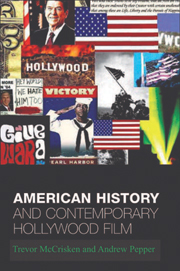Book contents
- Frontmatter
- Contents
- Acknowledgements
- Preface
- Introduction
- 1 Lessons from Hollywood's American Revolution
- 2 Rattling the chains of history: Steven Spielberg's Amistad and ‘telling everyone's story’
- 3 Hollywood's Civil War dilemma: to imagine or unravel the nation?
- 4 Saving the Good War: Hollywood and World War II in the post-Cold War world
- 5 Oliver Stone and the decade of trauma
- 6 From Civil Rights to Black Nationalism: Hollywood v. black America?
- 7 Hollywood's post-Cold War history: the ‘righteousness’ of American interventionism
- Select Bibliography
- Index
1 - Lessons from Hollywood's American Revolution
Published online by Cambridge University Press: 05 August 2013
- Frontmatter
- Contents
- Acknowledgements
- Preface
- Introduction
- 1 Lessons from Hollywood's American Revolution
- 2 Rattling the chains of history: Steven Spielberg's Amistad and ‘telling everyone's story’
- 3 Hollywood's Civil War dilemma: to imagine or unravel the nation?
- 4 Saving the Good War: Hollywood and World War II in the post-Cold War world
- 5 Oliver Stone and the decade of trauma
- 6 From Civil Rights to Black Nationalism: Hollywood v. black America?
- 7 Hollywood's post-Cold War history: the ‘righteousness’ of American interventionism
- Select Bibliography
- Index
Summary
There are a number of points of departure for this chapter, and this book as a whole. The first relates to the vexed question of historical accuracy and the now familiar complaint that Hollywood films deliberately falsify the historical record, as though that record itself is somehow inviolate and unchanging. As we argued in the Introduction, we begin from the assumption that what should concern us when considering how the past is represented is not so much the issue of how accurately films represent history but rather what they can reveal to us about the ways in which history is told and how film's engagement with history has been shaped by the material conditions under which filmmakers construct their narratives and audiences watch and make sense of them. We are interested primarily in the ways in which filmmakers have used, and are using, American history as a way of engaging with the question of what ‘America’ stands for, culturally and politically, in the post-Cold War world. In this particular chapter, what interests us, therefore, is how an event as sanctified as the American Revolution – one that continues to occupy a privileged position in the benign meta-narrative of American history – is used and transformed by filmmakers both to reveal something about the event itself and to shed some light on our own cultural and political moment. What is at stake here is not only the question of how or indeed whether Hollywood's role as public historian has changed.
- Type
- Chapter
- Information
- American History and Contemporary Hollywood Film , pp. 15 - 38Publisher: Edinburgh University PressPrint publication year: 2005



